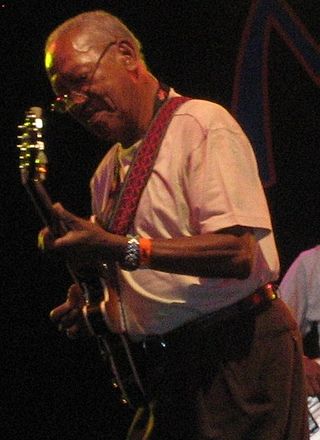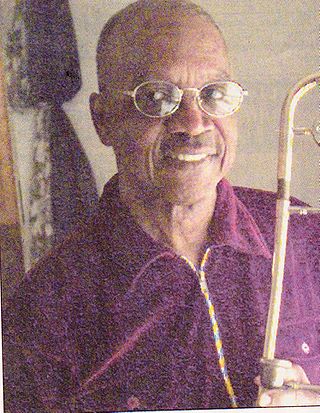Related Research Articles

Reggae is a music genre that originated in Jamaica in the late 1960s. The term also denotes the modern popular music of Jamaica and its diaspora. A 1968 single by Toots and the Maytals, "Do the Reggay", was the first popular song to use the word reggae, effectively naming the genre and introducing it to a global audience. While sometimes used in a broad sense to refer to most types of popular Jamaican dance music, the term reggae more properly denotes a particular music style that was strongly influenced by traditional mento as well as American jazz and rhythm and blues, and evolved out of the earlier genres ska and rocksteady. Reggae usually relates news, social gossip, and political commentary. It is instantly recognizable from the counterpoint between the bass and drum downbeat and the offbeat rhythm section. The immediate origins of reggae were in ska and rocksteady; from the latter, reggae took over the use of the bass as a percussion instrument.
The music of Jamaica includes Jamaican folk music and many popular genres, such as mento, ska, rocksteady, reggae, dub music, dancehall, reggae fusion and related styles.

Clement Seymour "Coxsone" Dodd was a Jamaican record producer who was influential in the development of ska and reggae in the 1950s, 1960s and beyond.
Panama is a Central American country, inhabited mostly by mestizos. The music of Panama is heavily based on the folk music of Spain, particularly that of Andalusia and was influenced first by the indigenous populations of Kunas, Teribes, Ngobe Bugle and others, and then by the black population who were brought over, first as slaves from Africa, between the 16th century and the 19th century, and then voluntarily to work on the Panamanian Railroad and Canal projects between the 1840s and 1914.
Mento is a style of Jamaican folk music that predates and has greatly influenced ska and reggae music. It is a fusion of African rhythmic elements and European elements, which reached peak popularity in the 1940s and 1950s. Mento typically features acoustic instruments, such as acoustic guitar, banjo, hand drums, and the rhumba box — a large mbira in the shape of a box that can be sat on while played. The rhumba box carries the bass part of the music.

Ernest Ranglin is a Jamaican guitarist and composer who established his career while working as a session guitarist and music director for various Jamaican record labels including Studio One and Island Records. Ranglin played guitar on many early ska recordings and helped create the rhythmic guitar style that defined the form. Ranglin has worked with Theophilus Beckford, Jimmy Cliff, Monty Alexander, Prince Buster, the Skatalites, Bob Marley and the Eric Deans Orchestra. He is noted for a chordal and rhythmic approach that blends jazz, mento and reggae with percussive guitar solos incorporating rhythm 'n' blues and jazz inflections.
The 'music of the Virgin Islands reflects long-standing West Indian cultural ties to the island nations to the south, the islands' African heritage and European colonial history, as well as recent North American influences. Though the United States Virgin Islands and British Virgin Islands are politically separate, they maintain close cultural ties. From its neighbors, the Virgin Islands has imported various pan-Caribbean genres of music, including calypso music and soca music from Trinidad and reggae from Jamaica.
There are several subgenres of reggae music including various predecessors to the form.
Afro-Caribbean music is a broad term for music styles originating in the Caribbean from the African diaspora. These types of music usually have West African/Central African influence because of the presence and history of African people and their descendants living in the Caribbean, as a result of the trans-Atlantic slave trade. These distinctive musical art forms came about from the cultural mingling of African, Indigenous, and European inhabitants. Characteristically, Afro-Caribbean music incorporates components, instruments and influences from a variety of African cultures, as well as Indigenous and European cultures.
Roland Alphonso OD or Rolando Alphonsoa.k.a. "The Chief Musician" was a Jamaican tenor saxophonist, and one of the founding members of the Skatalites.

Leroy Sibbles is a Jamaican reggae musician and producer. He was the lead singer for The Heptones in the 1960s and 1970s.
Méringue, also called méringue lente or méringue de salon, is a dance music and national symbol in Haiti. It is a string-based style played on the lute, guitar, horn section, piano, and other string instruments unlike the accordion-based merengue, and is generally sung in Haitian Creole and French, as well as in English and Spanish.
Lloyd Parks is a Jamaican reggae vocalist and bass player who has recorded and performed as a solo artist as well as part of Skin, Flesh & Bones, The Revolutionaries, The Professionals, and We the People Band.
The Skatalites are a ska band from Jamaica. They played initially between 1963 and 1965, and recorded many of their best known songs in the period, including "Guns of Navarone." They also played on records by Prince Buster and backed many other Jamaican artists who recorded during that period, including Bob Marley & The Wailers, on their first single "Simmer Down." They reformed in 1983 and have played together ever since.

The Jolly Boys are a mento band from Port Antonio, Jamaica. It was formed in 1945 and had great commercial success in the late 1980s and 1990s among reggae and world music fans. They released a new album in 2010 Great Expectation and are currently the house band at GeeJam, a hotel in Port Antonio.
Winston Cooper (c.1929–1995), better known as Count Matchuki or Count Machuki, was a Jamaican deejay.

Carlos Malcolm OD is a world renowned Jamaican trombonist, percussionist and bandleader who helped cultivate the infamous Jamaican genres of music known as Ska and Reggae.

Lord Flea was the stage name of Norman Byfield Thomas, a Jamaican mento musician credited with "helping start the calypso craze in U.S." With his band The Calypsonians, Flea toured America throughout the late 1950s, and released an album on the Capitol label. The band also performed in two calypso-related films.

Pop 'n' Mento is the third album by Jamaican mento band the Jolly Boys, released in September 1989 by American label First Warning and British label Cooking Vinyl. The album was produced by American singer-songwriter Jules Shear, who discovered the Jolly Boys performing in a Port Antonio hotel. He digitally recorded the group in one take, using a minimal set-up to accommodate the group's acoustic instruementation. The record features a set of mento standards, and mixed elements from the genre's past with contemporary sounds.
References
- ↑ Wayne Chen.Reggae routes: the story of Jamaican music. Temple University Press, 1998. ISBN 1-56639-629-8, ISBN 978-1-56639-629-5